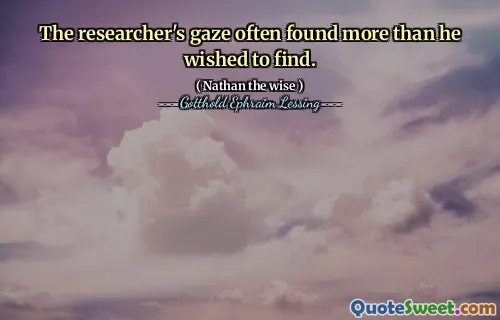Gotthold Ephraim Lessing was a pivotal figure in the German Enlightenment, celebrated for his contributions to literature, philosophy, and theater. He was born in 1729 in Kamenz, Saxony, and grew up in a time of significant intellectual and cultural change. Lessing's early influences included the works of classical writers and his interest in rationalism, leading him to question traditional beliefs and advocate for reason and freedom of thought. Lessing is renowned for his plays, particularly "Nathan the Wise," which emphasizes tolerance and humanism and critiques religious dogmatism. His works sought to bridge cultural and religious divides, promoting understanding among different faiths. Through his writings, he challenged societal norms and encouraged a dialogue that transcended the limitations of his era. In addition to his dramatic works, Lessing made lasting impacts in the realm of philosophy and criticism. He is often considered a precursor to modern literary criticism, as he explored the nature of aesthetics and the role of the author. His ideas have influenced countless thinkers and writers, solidifying his status as a key figure in the development of modern thought.
Gotthold Ephraim Lessing was born on January 22, 1729, in Kamenz, Saxony, and he became a prominent figure during the German Enlightenment. His early engagement with classical literature and rationalist ideas shaped his critical outlook on society and religion.
Lessing's most famous works include plays like "Nathan the Wise," which advocate for tolerance and understanding among different cultures and religions. His writing reflects a strong commitment to humanism and challenges religious intolerance, making him a key voice in promoting Enlightenment values.
As a literary critic and philosopher, Lessing's exploration of aesthetics and the role of literature laid the groundwork for future literary criticism. His ideas about the importance of individual thought and expression have had a lasting influence on literature and philosophy.
More »
Today Birthdays
1729 -
Edmund Burke
1949 -
Haruki Murakami
1954 -
Howard Stern
1876 -
Jack London
1993 -
Zayn Malik
1951 -
Kirstie Alley
1863 -
Swami Vivekananda
1923 -
Alice Miller
1987 -
Naya Rivera
1825 -
Brooke Foss Westcott
1944 -
Joe Frazier
1951 -
Rush Limbaugh
1964 -
Jeff Bezos
1978 -
Jeremy Camp
1628 -
Charles Perrault
1856 -
John Singer Sargent
1970 -
Kaja Foglio
1953 -
Rick Santelli
1986 -
Gemma Arterton
1968 -
Raf Simons
1958 -
Christiane Amanpour
1966 -
Olivier Martinez
1996 -
Ella Henderson
1917 -
Maharishi Mahesh Yogi
1949 -
Ottmar Hitzfeld
1928 -
Ruth Brown
1968 -
Heather Mills
1946 -
George Duke
1968 -
Rachael Harris
1923 -
Ira Hayes
